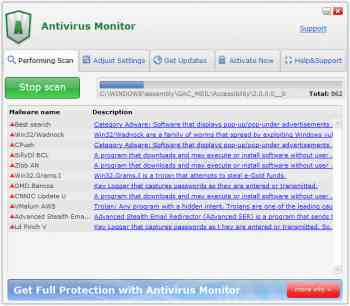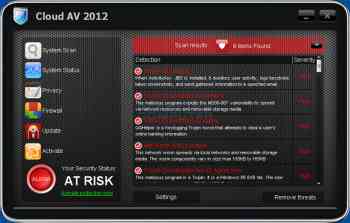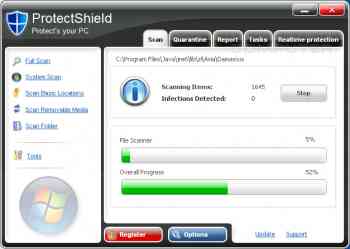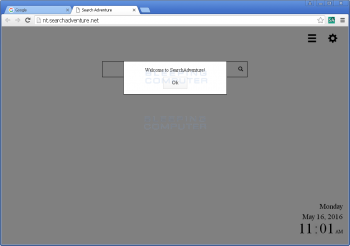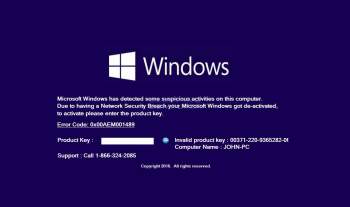Certain types of adware, PUPs (Potentially Unwanted Programs), or malware can be associated with a particular family or developer. The programs that are part of the same family typically contain similar graphical user interfaces, characteristics, and functionality.
Below are known families and individual programs that belong to them. You can click on a particular family to learn more about them.
-
Rogue.WinWebSec
The Rogue.WinWebSec family of infections consist of rogue anti-spyware programs that attempt to trick you into thinking that your computer is infected and has severe security problems. It does this by displaying numerous fake alerts and nag screens that state that malware is transmitting private information to a remote location or that unauthorized users are connected to your computer. This infection will also not allow you to run your normal applications, and when you attempt to run them, it will display a warning stating that the program is infected. Finally, when this program scans your computer it will also state that there are numerous infections present, but it will only "fix" them if you first purchase the program.
Read More -
Rogue.FakeMSE
The Rogue.FakeMSE family of infections are rogue anti-spyware programs that are installed by alerts that pretend to be from the legitimate Microsoft Security Essentials program. When first installed, this infection will generate fake Microsoft Security Essentials alerts when you attempt to run a program. These fake alerts will state that the program you are trying to run is infected and then prompt you to perform a variety of fake scans. After these fake scans are completed it will then prompt you to install the rogue onto your computer. Regardless of what you do, the rogue is already present and you will continue to be pestered until you allow it to supposedly be installed.
Read More -
Rogue.FakeHDD
The Rogue.FakeHDD family of infections consist of rogue computer optimization programs that attempt to trick you into thinking that there are problems with the hard drives on your computer. It does this by displaying numerous fake alerts and nag screens that state that hard drive has errors, files cannot be found, or data is corrupt. For example, when you attempt to run a program, instead of allowing the program to run, it will terminate it and display a warning stating that the program is corrupted. When this program scans your computer it will also say that there are numerous problems with your computer's hard drive and hardware, but it will state that it can fix them if you first purchase the program. Even more alarming for infected users, is that these programs will change all the files on your hard drive so that they become hidden. This will cause an infected user to think that there files have all been deleted, when in fact they are still there.
Read More -
Rogue.SysguardFakeAV
The Rogue.SysguardFakeAV family of infections consist of rogue anti-spyware programs that attempt to trick you into thinking that your computer is infected and has severe security problems. It does this by displaying numerous fake alerts and nag screens that state that malware is transmitting private information to a remote location or that unauthorized users are connected to your computer. When this program scans your computer it will also state that there are numerous infections present, but it will only "fix" them if you first purchase the program.
Read More -
Rogue.Mac-FakeRean
The Rogue.Mac-FakeRean family of infections are the first rogue anti-spyware programs specifically developed for the Apple Macintosh computers. These infections are promoted through hacked web sites that when visited would redirect you to a fake online scanner page. This page will then state that your Mac was infected and prompt you to download and install the program. As Safari has a default setting to download, open, and start the installation program of certain Mac files, the developers of this rogue use this to their advantage to get the program installed fairly easily on a Mac. For the most part, this current incarnation is not aggressive and is fairly easy to remove. It is more notorious for being the first of its type to appear for the Mac.
Read More -
Rogue.FakeRean-Braviax
The Rogue.FakeRean-Braviax family of infections consist of rogue anti-spyware programs that attempt to trick you into thinking that your computer is infected and has severe security problems. It does this by displaying numerous fake alerts and nag screens that state that malware is transmitting private information to a remote location or that unauthorized users are connected to your computer. This infection will also not allow you to run your normal applications, and when you attempt to run them, it will display a warning stating that the program is infected. Finally, when this program scans your computer it will also state that there are numerous infections present, but it will only "fix" them if you first purchase the program.
Read More -
Rogue.FakeDLL
The Rogue.FakeDLL family of infections consist of rogue anti-spyware programs that attempt to trick you into thinking that your computer is infected and has severe security problems. It does this by displaying numerous fake alerts and nag screens that state that malware is transmitting private information to a remote location or that unauthorized users are connected to your computer. When this program scans your computer it will also state that there are numerous infections present, but it will only "fix" them if you first purchase the program.
Read More -
Rogue.FakeScanti
The Rogue.FakeScanti family of infections consist of rogue anti-spyware programs that attempt to trick you into thinking that your computer is infected and has severe security problems. It does this by displaying numerous fake alerts and nag screens that state that malware is transmitting private information to a remote location or that unauthorized users are connected to your computer. When this program scans your computer it will also state that there are numerous infections present, but it will only "fix" them if you first purchase the program.
Read More -
Rogue.WinPCDefender
The Rogue.WinPCDefender family of infections consist of rogue anti-spyware programs that attempt to trick you into thinking that your computer is infected and has severe security problems. It does this by displaying numerous fake alerts and nag screens that state that malware is transmitting private information to a remote location or that unauthorized users are connected to your computer. When this program scans your computer it will also state that there are numerous infections present, but it will only remove these so-called infections if you first purchase the program.
Read More -
Rogue.FakeVimes
The Rogue.FakeVimes family of infections consist of rogue anti-spyware programs that display fake security alerts and false scan results in order to trick you into thinking your computer is infected. When first installed this family of rogues will create harmless files in the %UserProfile%\Recent\ directory that will be detected as malware when the rogue scans your computer. If you attempt to remove any of these detected files, though, it will state that you first need to purchase the program before being able to do so.
Read More -
Rogue.FakeSmoke
The Rogue.FakeSmoke family of infections consist of rogue anti-spyware programs that display fake security alerts and false scan results in order to trick you into thinking your computer is infected. When first installed this family of rogues will create hundreds of fake and harmless malware files that will be detected as malware when the program scans your computer. If you attempt to remove any of these detected files with the rogue it will state that you first need to purchase the program before being able to do so.
Read More -
Rogue.FakeCog
The Rogue.FakeCog family of infections consist of rogue anti-spyware programs that display fake security alerts and false scan results in order to trick you into thinking your computer is infected. If you attempt to remove any of these detected files, though, it will state that you first need to purchase the program before being able to do so. When a rogue from this family is first installed it will attempt to uninstall any detected anti-virus program in order to protect itself from being removed.
Read More -
Rogue.FakeXPA
The Rogue.FakeXPA family of infections consist of rogue anti-spyware programs that display fake scan results and security alerts to trick you into thinking that your computer is infected and has severe security problems. It does this by displaying numerous fake alerts and nag screens that state that malware is transmitting private information to a remote location, your computer is under attack, or that unauthorized users are connected to your computer. Finally, when this program scans your computer it will also state that there are numerous infections present, but it will only "fix" them if you first purchase the program.
Read More -
Rogue.Contra
The Rogue.Contra family of rogue anti-spyware programs attempts to trick you into purchasing the program by making you think that your computer is severely infected or is under attack. It does this by displaying fake security alerts that state that your programs are infected or that your computer has been hacked. When installed, these rogues will also create numerous harmless files on your computer. These files will then be detected as malware when the program scans your computer. It does this to try and validate the scan results by having the files actually exist on your computer.
Read More -
Rogue.PCDefPlus
The Rogue.PCDefPlus family of rogue anti-spyware programs attempts to trick you into purchasing the program by making you think that your computer is severely infected or is under attack. It does this by displaying fake security alerts that state that your programs are infected or that your computer has been hacked. This infection will also not allow you to run your normal applications and will instead display an alert that states they are infected when you attempt to run them. Finally, when this program scans your computer it will state that numerous files are infected, but will not allow you to clean them until you purchase the program.
Read More -
Troj/Reveton-Ransomware
The Troj/Reveton-Ransomware family consists of computer infections that lock you out of computer unless you pay a ransom. It does this by displaying a lock screen when you login to Windows that pretends to be from a law enforcement agency in your country. For example, if you are in the United States of America the message may be from the FBI and if you are in the United Kingdom the message would pretend to be from the Metropolitan Police Service. In order to access your computer you must submit a MoneyPak voucher, or other payment coupon, to the malware developers and they will then unlock your computer so you can access your Windows desktop again.
Read More -
Troj/Urausy Ransomware
The Troj/Urausy Ransomware family consists of computer infections that pretends to be a government agency locking you out of your computer unless you pay a ransom. The infection locks you out of your computer by displaying a lock screen before you can access the Windows desktop. This lock screen states that you are breaking the law by viewing child pornography, distributing copyrighted programs, or downloading copyright programs. In order to remove the lock screen you will be required to pay a fine in the form of a MoneyPak or CashNow voucher that you input into the lock screen. This screenlocker is obviously not from a government agency, so please do not pay the requested ransom.
Read More -
Trojan:Win32/Harasom.A Ransomware
Trojan:Win32/Harasom.A, also known as Gen:Variant.Zusy, is a family of infections that are classified as Ransomware because they block you from gaining access to your Windows desktop, applications, or files until you pay a ransom. This family of infections will also encrypt all of your data files and change them to a HTML file. When you double-click on one of these files, the HTML file will open showing you an image that states that the file is encrypted. The types of files that this infection encrypts include .ddrw, .pptm, .dotm, .xltx, .text, .docm, .djvu, .potx, .jpeg, .pptx, .sldm, .lnk, .txt, .xlsm, .sldx, .xlsb, .ppam, .xlsx, .ppsm, .ppsx, .docx, .odp, .eml, .ods, .dot, .php, .xla, .pas, .gif, .mpg, .ppt, .bkf, .sda, .mdf, .ico, .dwg, .mbx, .sfx, .mdb, .zip, and .xlt.
Read More -
Adware/ShortcutHijacker
This family of Adware programs hijack your browser settings so that the home page and search providers use the hijacked web site. To make it more frustrating, this adware will modify any installed browser's shortcuts so that the adware web site is opened even when you change your homepage to a different site. This makes it impossible to clean your computer of this adware without specialized tools like Shortcut Cleaner.
Read More -
Adware.Vitruvian
Adware.Vitruvian is an adware family that injects advertisements into web sites that you visit. When this adware is installed, words on web sites will be underlined that display an advertisement when you hover over them. This adware will also display pop-up ads in new tabs or browser Windows when you click on navigation links on web sites. These ads will typically be for other adware or potentially unwanted programs.
Read More -
Adware.Salus
The Adware.Salus family may be one of the most intrusive adware programs currently out. Adware programs that are part of this family inject numerous and highly intrusive advertisements into web sites that you visit. These advertisements can be so large that they push the normal content of the page farther down the screen to the point that you are unable to read the site's content without first scrolling down. Due to the constant bombardment of advertisements, you will find that your computer becomes sluggish, your web browsers are slow or freeze, and your hard disk is constantly being accessed.
Read More -
Adware.TUTO$PC.Widget
The Adware.TUTO$PC.Widget adware family are programs that display a widget on your desktop that advertises daily offers for games and other software. When installed, this adware will occasionally prompt you to install programs that it is promoting. Unfortunately, the majority of these promoted programs contain other adware that will further hurt the performance of your computer.
Read More -
Adware.BrowseFox
Adware.BrowseFox is a family of programs that injects advertisements into web pages that you are visiting and search engine search results. When installed, this family will install Addons, Extensions, or Browser Helper Objects depending on the web browsers that you have installed. This allows the Adware.BrowseFox variant to inject advertisements into the web sites that you are visiting.
Read More -
Trojan.Tech-Support-Scam
Programs that are part of the Rogue.Tech-Support-Scam use legitimate utilities that are bundled with Trojans that display fake alerts that try to scare you into calling a remote tech support phone number. These alerts are displayed in such a way that it appears that your computer has a serious issue such as fake crash screens, alerts that Windows is not activated, or just annoying popups that constantly display the same message.
Read More -
Adware.CloudGuard
Adware.CloudGuard is an adware program that injects advertisements into web pages and search result pages. If a program that is part of this family is installed, users will see ad listings that are unrelated to the search engine you are using. When browsing the web, this adware family will also show numerous advertisements on web sites that you are viewing that overlay the site's content. This makes it very difficult to read the content of the web page you are visiting.
Read More -
Adware.Privox
Adware.Privox is a a family of adware programs that utilize the free Privoxy proxy server to inject advertisements into web sites that you are browsing. When the adware displays advertisements they will overlay the content of the web page and make it difficult to view the original content.
Read More



